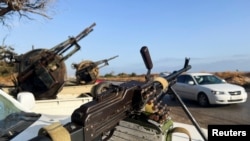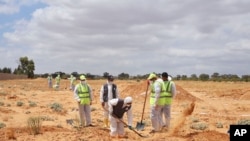A damning report by U.N. investigators on the human rights situation in Libya accuses the government and opposition groups of committing gross violations with impunity, many of which could amount to crimes against humanity. The report will be submitted to the U.N. Human Rights Council on Wednesday.
This is the third report by the three-member Independent Fact-Finding Mission on Libya since it began documenting allegations of human rights violations in that country in 2016.
The investigators find Libya to be a country that does not respect the rule of law, where perpetrators of national and international crimes are not held accountable for their actions. This conclusion is based on hundreds of interviews and reams of information and evidence gathered from many sources.
This latest report encompasses the period from March until June. The investigators looked at conditions of detention in 27 official and unofficial facilities, including secret and extra-legal prisons. Mission chair Mohamed Auajjar says the investigation has identified clear patterns of human rights violations in all these places.
“Based on more than 80 interviews with former and current detainees, their relatives, and insider witnesses, the mission has reasonable grounds to believe that crimes against humanity were perpetrated, such as murder, torture, imprisonment, rape, enforced disappearance and other inhumane acts in a number of prisons,” he said.
Judicial authorities in Libya have said in the past they would investigate the violations.
The mission carried out detailed investigative work in Tarhuna, a town in the suburbs of the capital, Tripoli, and the former stronghold of eastern warlord Khalifa Haftar’s forces.
Auajjar says the mission has documented widespread and systematic cases of extermination, murder, torture and other violations amounting to crimes against humanity, which were committed by al-Kani militias, loyal to Haftar.
“The mission also succeeded in identifying previously undiscovered mass graves in Tarhuna through the use of advanced technology. … Despite the continuous efforts by the Libyan authorities to exhume the mass graves in Tarhuna, reports show that over 200 individuals are still missing,” he said.
The investigators find discrimination and violence to be a feature of daily life for most women and girls. They note children are subjected to similar human rights violations as adults, including summary executions, arbitrary detention, sexual and gender-based violence and torture.
The fact-finding mission calls on the Libyan authorities to strengthen their role in protecting and promoting human rights. Without justice and remedies for victims of abuse, it says national reconciliation will be difficult to achieve.
The investigators say they will compile a confidential list of individuals suspected of serious crimes and a summary of evidence related to them. The list will be handed to the U.N. Human Rights Council for use in potential criminal prosecutions.





